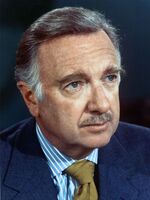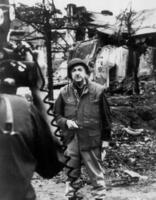Walter Cronkite (1916 - 2009)
By Connie Tran
Walter Leland Cronkite Jr. was a prominent American journalist and broadcaster born in St. Joseph, Missouri in 1916. His newcasts with the CBS News played a significant role in shaping the American public opinion on the Vietnam War. Cronkite began his career as a war correpondent for World War II, then became the anchorman for “The CBS Evening News” amidst the peak of the Cold War. Walter Cronkite was a patriot, and like many other journalists of his time, he believed in the government and its mission in fighting against the spread of communism. However, in public broadcast, Cronkite often remained neutral about the war which earned him the reputation of being objective and “the most trusted man in America.”
Following his visit to Vietnam in 1968, especially to Hue, the epicenter of the most intense battles, Cronkite’s opinion on the war began to change. Here, he witnessed the brutality and sufferings faced by both the US troops and Vietnamese civilians. As seen in the photo from the report, Cronkite was standing in front of a bombed out area with his helmet on, suggesting the danger of battlefield.
Upon his return to the US, the CBS News aired “Report from Vietnam: Who, What, When, Where, Why?,” an one-hour special broadcast where Cronkite delivered his famous verdict that exposed the brutal truth of the war, sending shockwaves throughout the nation. In the verdict, Cronkite stated, “[I]t seems now more certain than ever that the bloody experience of Vietnam is to end in a stalemate . . . [I]t is increasingly clear to this reporter that the only rational way out then will be to negotiate, not as victors, but as an honorable people who lived up to their pledge to defend democracy, and did the best they could.”
This marked a significant shift for Cronkite, as he departed from his initial objectivity and took a clear stance on the war. In the verdict, he exposed the brutal reality that he witnessed during his time in Vietnam, debunking the government’s narrative of American victory. He predicted that the war would end in a stalemate as both sides would suffer heavy casualties and losses. Therefore, Cronkite believed that the US must end the war in Vietnam with a peaceful negotiation.
Cronkite’s verdict and CBS News’ special report on the Vietnam War had a profound impact on the American people, especially those who had supported the war due to their belief in the government’s narrative. This also changed the American political scene, as President Johnson recognized the influence of Cronkite’s report, stating “If I’ve lost Cronkite, I’ve lost Middle America.” Antiwar sentiment gained momentum in Congress, with Congressmen increasingly advocating for peace and attacking the administration for prolonging the war.
By August 1968, the Gallup, an organization gauging American public opinion, documented a significant plunge in the number of war supporters compared to the first half of the year. It reflects a notable evolution of American people’s opinions on the war happening in Vietnam.

